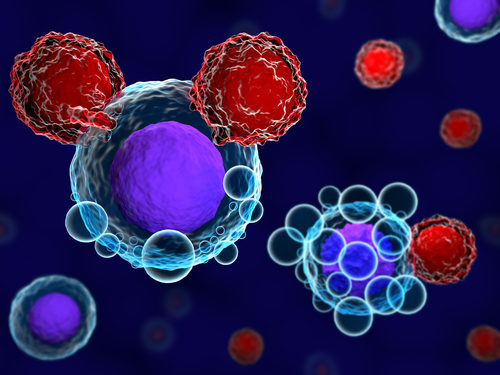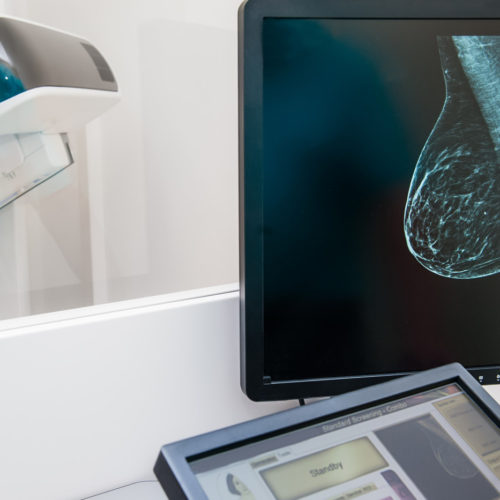BrickBio’s antibody-drug conjugate BRKB-28 showed preclinical effectiveness in eradicating breast cancer cells while leaving healthy cells unharmed, the company announced. BRKB-28 combines an antibody against a cancer protein with a toxic payload, using a linker molecule that connects the two. Once bound to its target, BRKB-28 releases its toxic compound into cancer cells, triggering their…
Author: Chris
Biogen, Eisai Request Approval of Aducanumab for Alzheimer’s in Japan
Biogen and Eisai are seeking approval of aducanumab (BIIB037) for the treatment of Alzheimer’s disease in Japan, the companies have announced. If approved, aducanumab will become the first therapy with the potential to slow the clinical decline seen in patients with Alzheimer’s. “The filing of the application is an important step in serving patients and their…
Study Describes New Way to Place CRISPR/Cas9 Into Cancer Cells
Researchers have developed a new technology that can be used to deliver the gene-editing tool CRISPR/Cas9 into prostate cancer cells without the need for viral vectors, a proof-of-concept study demonstrates. The study, “ZIF-C for targeted RNA interference and CRISPR/Cas9 based gene editing in prostate cancer,” was published in Chemical Communications. Cancer cells harbor genetic changes that…
EU Approval Urged for Bavencio as Maintenance Therapy for Bladder Cancer
A European Medicines Agency (EMA) committee has adopted a positive opinion on Bavencio (avelumab), recommending its approval as a first-line maintenance treatment for adults with locally advanced or metastatic bladder cancer (urothelial carcinoma) who have not progressed after platinum-based chemotherapy. The opinion, from the EMA’s Committee for Medicinal Products for Human Use (CHMP), will now…
$3.2M NIH Grant Supports Development of New Approach to Target ‘Invisible’ Residual Tumors
A $3.2-million grant from the National Institutes of Health has been awarded to the collaborative work between Northeastern University’s Spring Lab and Cellaria into a new method of eliminating the microscopic cancerous tumors left behind by standard therapies. The approach uses antibody-photosensitizer molecules that make cancer cells susceptible to light-induced destruction. Researchers will mainly focus…
MMRF Joins Dana-Farber to Advance Research in Smoldering Myeloma
The Multiple Myeloma Research Foundation (MMRF) has joined forces with the Dana Farber Cancer Institute to develop new biomarkers and treatments for people with smoldering multiple myeloma (SMM) — a precursor condition to multiple myeloma. The collaboration will take advantage of MMRF’s data hub CureCloud and at-home genetic test program and Dana Farber’s expertise in SMM to build “the most…
Dosing Starts in Athira’s Phase 2 ACT-AD Trial Testing ATH-1017; Enrollment Ongoing
Athira Pharma has begun dosing patients in its Phase 2 clinical trial evaluating ATH-1017, an investigational small molecule for the treatment of mild to moderate Alzheimer’s disease. Clinical efficacy will be demonstrated by improvements in cognition and functional assessments among participants, compared with a placebo. “The initiation of our second late-stage study for ATH-1017 represents…
Keytruda Approval Recommended in EU as First-line Therapy for Certain Colorectal Cancers
Keytruda (pembrolizumab) has been recommended for approval in the European Union (EU) as a first-line treatment for adults with inoperable or metastatic colorectal cancer with certain genetic features. These include high microsatellite instability (MSI-H) or deficient mismatch repair (dMMR) — both good indicators of impaired DNA repair, which increase the number of mutations in a…
Computer Model Uses Enzyme Organization to Predict Early Breast Cancer Recurrence
The distinctive organization of enzymes in early breast ductal cancer can be used to correctly predict recurrences in 91% of cases, with 4% false negatives, a new study has found. The diagnostic tool may assist with the early identification of patients at high risk of cancer recurrence while reducing overdiagnosis and treatment of low-risk patients.…
Roche’s Cevostamab Leads to Durable, Deep Responses in Heavily Pre-Treated Patients
Cevostamab (BFCR4350A), a bispecific antibody developed by Roche, induces durable and deep responses in heavily pre-treated patients with relapsed or refractory multiple myeloma, according to early data from a Phase 1 trial. Preliminary data from the trial, called GO39775 (NCT03275103), also showed cevostamab had a manageable safety and toxicity profile when given in a single…











